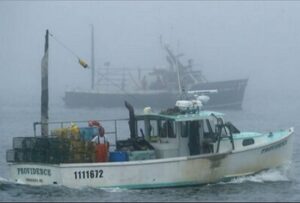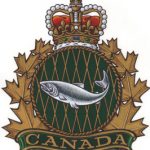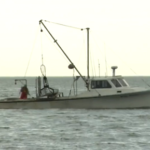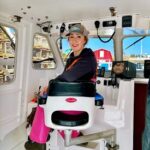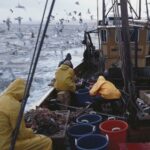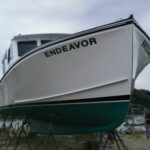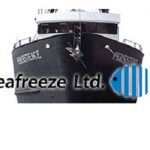Tag Archives: Icicle Seafoods
Local fishermen report mixed results in commercial season so far
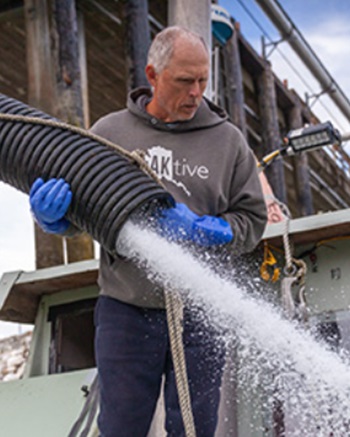 Nearly a dozen commercial fishing boats queued for gas and ice at the fuel dock on a foggy Saturday morning. The low tide set the pace slow enough for fishermen to talk to one another about the season even though they were eager to get underway. Boats bobbed up and down with names like Easy Street, Rustler, High Surf, Crown Haines, and Minnie A. Then the sun made its way through the morning clouds and the salty breeze carried the sounds of ice and fuel rolling through large plastic hoses hanging from the dock. It’s the third week since the season opener and fishermen like Matt Davis reflected on how the winds have shifted. more, >>CLICK TO READ<< 08:30
Nearly a dozen commercial fishing boats queued for gas and ice at the fuel dock on a foggy Saturday morning. The low tide set the pace slow enough for fishermen to talk to one another about the season even though they were eager to get underway. Boats bobbed up and down with names like Easy Street, Rustler, High Surf, Crown Haines, and Minnie A. Then the sun made its way through the morning clouds and the salty breeze carried the sounds of ice and fuel rolling through large plastic hoses hanging from the dock. It’s the third week since the season opener and fishermen like Matt Davis reflected on how the winds have shifted. more, >>CLICK TO READ<< 08:30
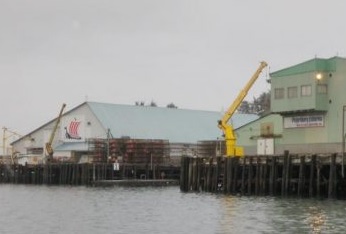
Icicle Seafoods, Ocean Beauty Seafoods merge salmon processing operations operations
Two of Alaska’s largest seafood companies are merging their salmon processing businesses. Icicle Seafoods and Ocean Beauty Seafoods will be combining forces to create OBI Seafoods. Talks of a potential merger have been circulating for months. There’s been speculation in the seafood industry press that the two Seattle-based companies are seeking to remain competitive against the other major industry players in Alaska. The two companies have very different ownership. Half of Ocean Beauty is owned by the Bristol Bay Economic Development Corporation. The other is a small group of Outside investors. Icicle on the other hand was bought by privately-held Canadian giant Cooke Seafoods in 2016. “The majority of — I don’t want to say majority — but a big chunk of the Alaska salmon processing sector is now partly owned or partly controlled by a major salmon farming company,” >click to read< 09:35
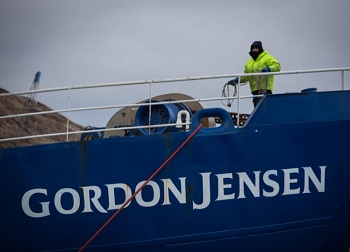
Coronavirus: Togiak herring fishery’s only processor says it aims for “zero impact” to communities
In early March, Icicle Seafoods locked down operations and stopped bringing on new crew members due to the pandemic. It says the workers on board its floating processor haven’t had contact with anyone off the vessel since then.,,, “Our plan is to bring the Gordon Jensen up to Togiak here at the end of the month. We’ll anchor off off shore, and we’ll keep our crew and staff on board the vessel for the duration of the fishery,” he said, adding that Icicle plans to have “zero impact” on the communities.,, Two seine boats and three gillnetters are expected to tap the 80-million pound quota in Togiak this spring. Tim Sands, an area management biologist for the Alaska Department of Fish and Game, said the shrinking participation from processors and fishermen is due to the lack of market for herring. >click to read< 18:33

Alaska canned pink salmon purchased for food assistance programs
Millions of pounds of Alaska’s 2019 harvest of pink salmon is now earmarked for child nutrition and related domestic food assistance programs, thanks to a U.S. Department of Agriculture purchase of over $25 million in canned product from four processors. USDA officials announced on Sept. 20 the purchase of 442.3 million cases of one-pound tall cans of pink salmon for the federal agency’s food assistance programs,,, >click to read< 10:36
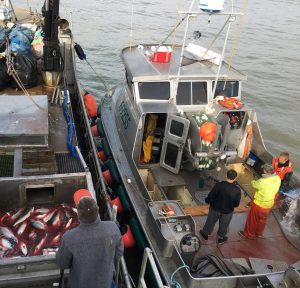
How much Bristol Bay processors will pay for salmon
The question on every Bristol Bay fisherman’s mind at this point in the season is base price: How much cash am I going to get for my salmon? A few Bristol Bay processors said they’re still waiting on their corporate headquarters to release prices, but here’s what we do know as of Tuesday: On Monday, Copper River Seafoods raised its price from $1.30 to $1.70 per pound for chilled, bled and separated sockeye only. Kings larger than 11 pounds bring in $3 per pound, and smaller kings go for $2 a pound. Copper River is paying 80 cents per pound on silvers, 45 cents per pound on chum and 30 cents per pound for pinks. Trident Seafoods is paying,,, >click to read<11:02
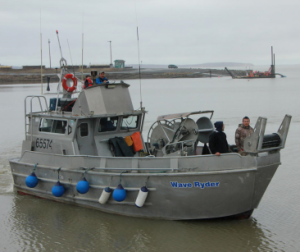
Togiak sac roe herring’s lone gillnetter calls it a season
Seagulls wheeled under gray skies, and low clouds spit rain as the F/V Wave Ryder motored back into Dillingham after nearly four weeks on the water near Togiak. The purse seine fleet took its quota by May 2, leaving Frank Woods and his crew on their own to fish for the 7,212 tons of herring allocated to gillnetters. On Thursday, he ended his season. The mood on the 32-foot aluminum drift boat was celebratory as it was hauled out and put up in the Peter Pan Seafoods boat yard. Audio, >click to read<22:10
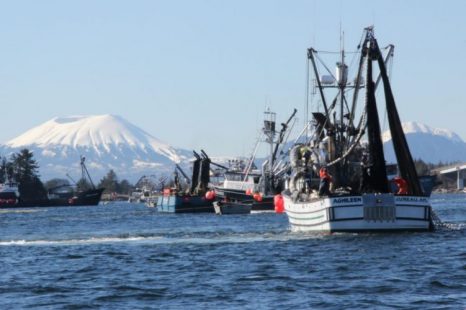
Commercial fleet highlights economic impact of Sitka Sound herring catch
Despite three days of impassioned testimony before the Board of Fisheries in January, not much has changed for the Sitka Sound sac roe herring fishery, which will ramp up in about a month. Local subsistence harvesters won an increase in the size of their exclusive use area, but failed to persuade the board to reduce the commercial catch. Fishermen and processors from Petersburg joined with other commercial interests to remind the board of the economic importance of the annual springtime export. >click to read< 14:53
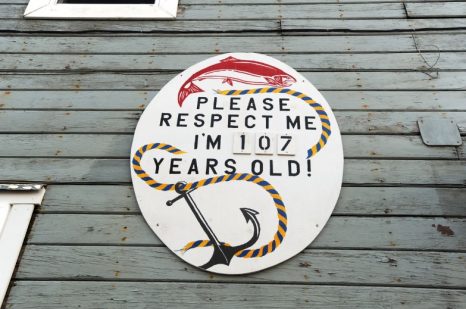
At Larsen Bay, a cannery where the tenacious rhythm of salmon season holds sway
The steam whistle exudes a pink cloud as it announces break time. A forklift loaded with cookies and hash browns zips from the mess hall across the wooden planks on which the Larsen Bay salmon cannery is built. The forklift stops in a corridor within a corrugated metal warehouse. “Form Two-Lines,” a hand-stenciled sign instructs, pointing to either side of the table. The staff places the food on the table, alongside oversized coffee thermoses. It’s time for mug-up. Icicle Seafoods employees rush past other handmade signs on their way to the cookies. Slime line workers with rubber-soled shoes and hairnets pass signs warning “Do not enter, hot cans!” at the juncture where golden tins are transferred from the cavernous pressure cookers, called retorts, into the building where the cans cool. click here to read the story 10:26
Hiring seafood workers in Bristol Bay has been tough for years. This summer, it’s worse.
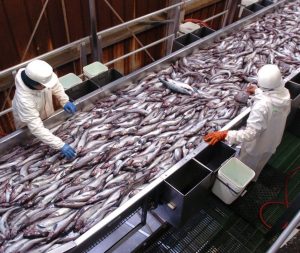 Seafood processors in Alaska’s Bristol Bay this summer have had trouble finding enough workers to handle the fish that come through their plants. Those in the industry say a confluence of factors, including a lack of visas for bringing foreign workers to the industry, a hotter economy in the Lower 48, and a record-breaking salmon run in Bristol Bay, was to blame. “There was a significant lack of process workers for some companies in the bay, and it exacerbated the problems of having to deal with high levels of harvest,” said John Garner, president of Seattle-based North Pacific Seafoods, which has locations across Alaska. Some processors couldn’t keep up with the huge amount of fish coming in, which forced them to resort to whatever method was fastest to get the pounds through the plant. click here to read the story 10:03
Seafood processors in Alaska’s Bristol Bay this summer have had trouble finding enough workers to handle the fish that come through their plants. Those in the industry say a confluence of factors, including a lack of visas for bringing foreign workers to the industry, a hotter economy in the Lower 48, and a record-breaking salmon run in Bristol Bay, was to blame. “There was a significant lack of process workers for some companies in the bay, and it exacerbated the problems of having to deal with high levels of harvest,” said John Garner, president of Seattle-based North Pacific Seafoods, which has locations across Alaska. Some processors couldn’t keep up with the huge amount of fish coming in, which forced them to resort to whatever method was fastest to get the pounds through the plant. click here to read the story 10:03
Cooke Aquaculture of Canada will purchase Icicle Seafoods
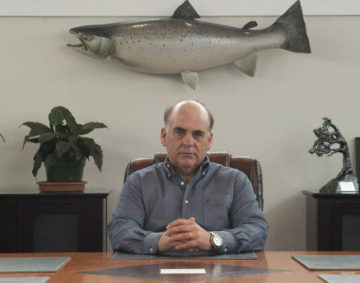 Cooke Aquaculture, a Canadian fisheries firm based in New Brunswick, said May 9 that the company has signed a definitive agreement to purchase Icicle Seafoods. The transaction is anticipated to close in less than 30 days once all regulatory and legal matters have been completed, the company said. Financial terms of the agreement were not disclosed. Icicle, which began as Petersburg Fisheries Inc. in Southeast Alaska in 1965, is currently owned by the private equity firm Paine & Partners, with headquarters in Foster City, CA. With the acquisition, the Cooke group of companies will produce over 275,000 metric tons of seafood annually and generate $1.8 billion in annual sales, Cooke said. Glenn Cooke, president of Cooke Seafood, described the deal as “an exciting venture for us as it will add a well-respected fishery to our family businesses. Read the rest here 12:15
Cooke Aquaculture, a Canadian fisheries firm based in New Brunswick, said May 9 that the company has signed a definitive agreement to purchase Icicle Seafoods. The transaction is anticipated to close in less than 30 days once all regulatory and legal matters have been completed, the company said. Financial terms of the agreement were not disclosed. Icicle, which began as Petersburg Fisheries Inc. in Southeast Alaska in 1965, is currently owned by the private equity firm Paine & Partners, with headquarters in Foster City, CA. With the acquisition, the Cooke group of companies will produce over 275,000 metric tons of seafood annually and generate $1.8 billion in annual sales, Cooke said. Glenn Cooke, president of Cooke Seafood, described the deal as “an exciting venture for us as it will add a well-respected fishery to our family businesses. Read the rest here 12:15
Bristol Bay fishermen prepare for quality mandates
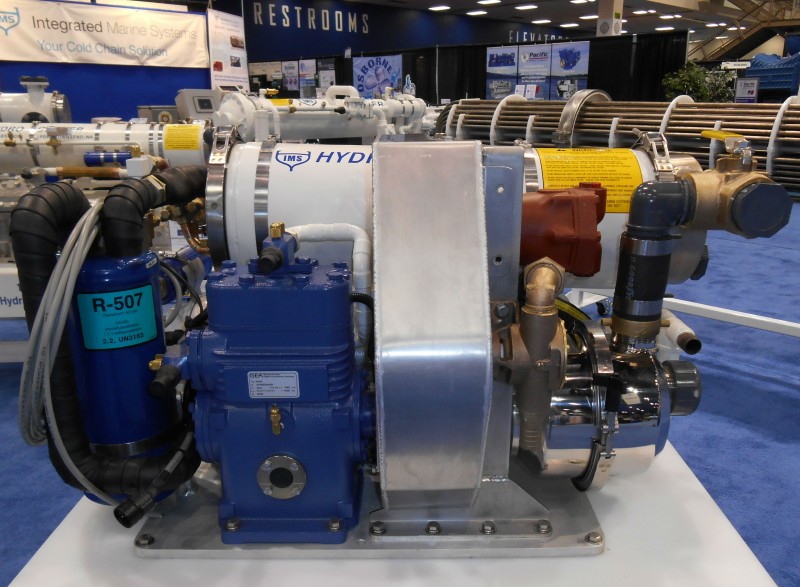 The coming mandate for higher quality fish deliveries in Bristol Bay could be particularly difficult for watershed residents, but some have said it could also be good news in the long term. At least one Bristol Bay processor, Icicle Seafoods, has told fishermen that they’ll stop buying dry fish in a few years after phasing in quality requirements, and more are expected to follow. Right now, the decision to ice or not is left to individual fishermen. Incentives help encourage chilling fish, but an individual can try to catch more fish to make up the price difference, and different fishermen make different choices. A quality mandate by even one processor will shift that, although fishermen may still have a range of options, from icing with slush bags or insulated holds, Read the rest here 12:33
The coming mandate for higher quality fish deliveries in Bristol Bay could be particularly difficult for watershed residents, but some have said it could also be good news in the long term. At least one Bristol Bay processor, Icicle Seafoods, has told fishermen that they’ll stop buying dry fish in a few years after phasing in quality requirements, and more are expected to follow. Right now, the decision to ice or not is left to individual fishermen. Incentives help encourage chilling fish, but an individual can try to catch more fish to make up the price difference, and different fishermen make different choices. A quality mandate by even one processor will shift that, although fishermen may still have a range of options, from icing with slush bags or insulated holds, Read the rest here 12:33
Trawlers banned from Unalaska Bay
 Unalaska Bay was completely shut down to trawlers by state regulators last week after a long campaign by the Unalaska Native Fisheries Association representing local small boats. The Alaska Board of Fisheries approved UNFA’s request last week while meeting in Anchorage, closing all waters of Unalaska Bay year-round to groundfish fishing with pelagic trawl gear, according to UNFA member and Unalaska resident Walter Tellman. The fish board voted 6-1 to close the bay to trawlers, he said. Opposed, Tellman said, were officials of and trawler captains. Brent Paine, the executive director of United Catcher Boats, declined to comment this week on the latest closure. Jim Paulin photo Read the article here 16:14
Unalaska Bay was completely shut down to trawlers by state regulators last week after a long campaign by the Unalaska Native Fisheries Association representing local small boats. The Alaska Board of Fisheries approved UNFA’s request last week while meeting in Anchorage, closing all waters of Unalaska Bay year-round to groundfish fishing with pelagic trawl gear, according to UNFA member and Unalaska resident Walter Tellman. The fish board voted 6-1 to close the bay to trawlers, he said. Opposed, Tellman said, were officials of and trawler captains. Brent Paine, the executive director of United Catcher Boats, declined to comment this week on the latest closure. Jim Paulin photo Read the article here 16:14
Cooke looking to buy Icicle Seafoods Alaska-based wild salmon processing in Alaska and whitefish operations
Acquisitive Canadian seafood entrepreneur Glenn Cooke is said to be closing in on a deal for US farming, fishing and processing firm Icicle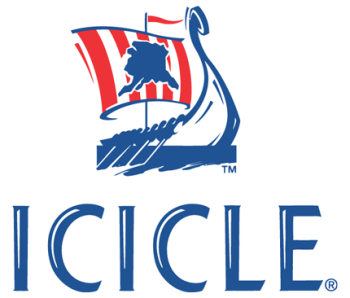 , which New York-based private equity Paine and Partners is desperately trying to offload. Cooke, who owns fish farming operations in Canada, the US, Chile, Scotland and Spain, has been linked to a move for the Icicle Washington State salmon farm ever since the start of the sale process, which got underway at the start of 2015. Now, Cooke is negotiating a deal for the salmon farm, as well as its Alaska-based wild salmon processing in Alaska and whitefish operations,,, Read the rest here 22:50
, which New York-based private equity Paine and Partners is desperately trying to offload. Cooke, who owns fish farming operations in Canada, the US, Chile, Scotland and Spain, has been linked to a move for the Icicle Washington State salmon farm ever since the start of the sale process, which got underway at the start of 2015. Now, Cooke is negotiating a deal for the salmon farm, as well as its Alaska-based wild salmon processing in Alaska and whitefish operations,,, Read the rest here 22:50
Icicle sues Alaska fisherman over $41k in unpaid credit
 Alaska salmon processor Icicle Seafoods has sued a fisherman who it extended more than $41,000 in credit to but who allegedly never repaid the debt, the company said. The Kodiak, Alaska fisherman, Randy Blondin, used the credit provided through a “fisherman’s account” to outfit the vessel Stephanie Lynn for the 2014 fishing season, according to the company. The complaint asks a judge to order US Marshals to seize the vessel until the matter is resolved Read the rest here 16:26
Alaska salmon processor Icicle Seafoods has sued a fisherman who it extended more than $41,000 in credit to but who allegedly never repaid the debt, the company said. The Kodiak, Alaska fisherman, Randy Blondin, used the credit provided through a “fisherman’s account” to outfit the vessel Stephanie Lynn for the 2014 fishing season, according to the company. The complaint asks a judge to order US Marshals to seize the vessel until the matter is resolved Read the rest here 16:26
Stephen Taufen – More than just Antitrust, Lender Liability & Your Boat Loan Read it here 20:54
Icicle Seafoods sale cancelled
 Icicle Seafoods owner Paine & Partners announced Sept. 4 that the sale of the company to buyers Dominion Catchers, LLC and Convergence Holdings, Inc. has been cancelled. The sale was anticipated to close in August and was announced in late June. Company representatives declined to comment further on the reasons for the cancellation. Some online industry sources have speculated that a provision in the American Fisheries Act which requires U.S. citizens to have 75 percent ownership and control of commercial fishing vessels 100 feet or greater in length may have played a role in the sale’s termination. Read the rest here 18:23
Icicle Seafoods owner Paine & Partners announced Sept. 4 that the sale of the company to buyers Dominion Catchers, LLC and Convergence Holdings, Inc. has been cancelled. The sale was anticipated to close in August and was announced in late June. Company representatives declined to comment further on the reasons for the cancellation. Some online industry sources have speculated that a provision in the American Fisheries Act which requires U.S. citizens to have 75 percent ownership and control of commercial fishing vessels 100 feet or greater in length may have played a role in the sale’s termination. Read the rest here 18:23
Paine & Partners Enters into Agreements to Sell Icicle Seafoods
 Under the transactions, Convergence will acquire Icicle’s land-based wild seafood processing and farmed salmon activities, and Dominion will acquire the Company’s harvesting and processing vessels as well as the associated fishing rights. Convergence and Dominion have agreed to enter into long-term contracts to continue Icicle’s diversified seafood operations following the completion of the transactions. Financial terms of the transactions and of the agreement between Convergence and Dominion were not disclosed. Read the rest here 17:47
Under the transactions, Convergence will acquire Icicle’s land-based wild seafood processing and farmed salmon activities, and Dominion will acquire the Company’s harvesting and processing vessels as well as the associated fishing rights. Convergence and Dominion have agreed to enter into long-term contracts to continue Icicle’s diversified seafood operations following the completion of the transactions. Financial terms of the transactions and of the agreement between Convergence and Dominion were not disclosed. Read the rest here 17:47
Foreign bids on Icicle higher than US suitors expected, players up against American Fisheries Act
 First round bids for the purchase of Icicle Seafoods — up for sale by private equity owner Paine & Partners — are far, far higher than expected, sources involved in the sale process told Undercurrent News. Major foreign players have — so far— made “insane” offers, well beyond what US-based companies are willing to pay. If foreign players ultimately do outbid their US competitors, they will have to fenagle their way around the American Fisheries Act, which limits foreign ownership of fishing vessels. Read the rest here 16:42
First round bids for the purchase of Icicle Seafoods — up for sale by private equity owner Paine & Partners — are far, far higher than expected, sources involved in the sale process told Undercurrent News. Major foreign players have — so far— made “insane” offers, well beyond what US-based companies are willing to pay. If foreign players ultimately do outbid their US competitors, they will have to fenagle their way around the American Fisheries Act, which limits foreign ownership of fishing vessels. Read the rest here 16:42
Icicle Calls It Quits in Adak – cites regulatory uncertainty as the deciding factor
KUCB – Unalaska – Just two years after reopening, the seafood processing plant in Adak is shutting down. Icicle Seafoods didn’t return calls for comment , but in a press release, CEO Amy Humphreys cites regulatory uncertainty as the deciding factor. Fishing in the western Aleutians has been restricted in recent years to protect an endangered stock of Steller sea lions, and an anticipated division of the Pacific cod harvest between the Bering Sea and Aleutian Islands could also impact shore-based processors. continued
, but in a press release, CEO Amy Humphreys cites regulatory uncertainty as the deciding factor. Fishing in the western Aleutians has been restricted in recent years to protect an endangered stock of Steller sea lions, and an anticipated division of the Pacific cod harvest between the Bering Sea and Aleutian Islands could also impact shore-based processors. continued

































